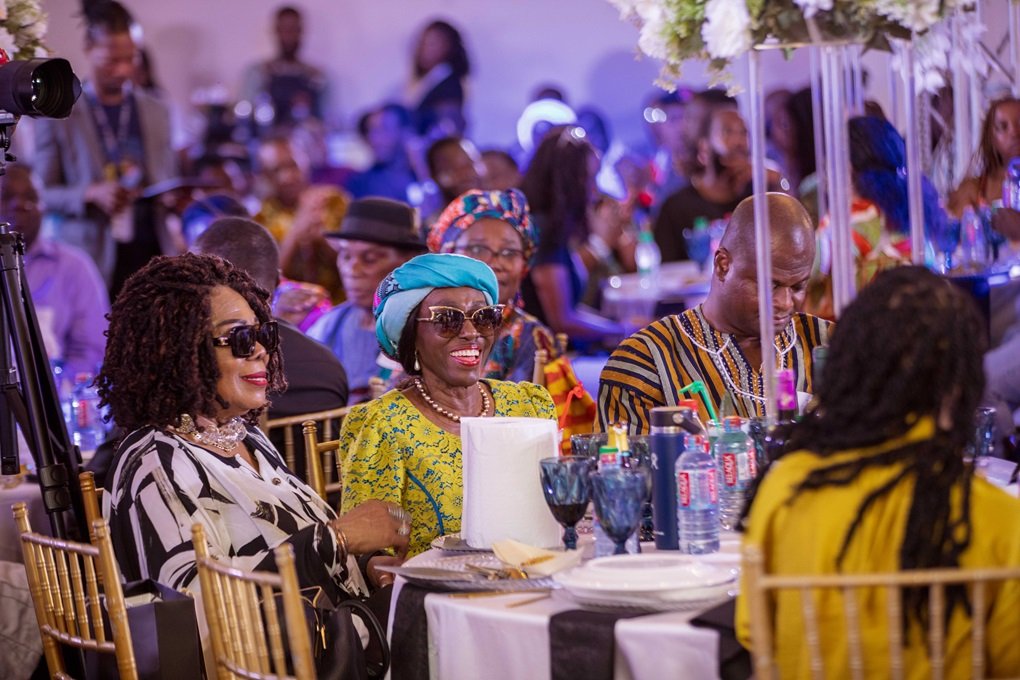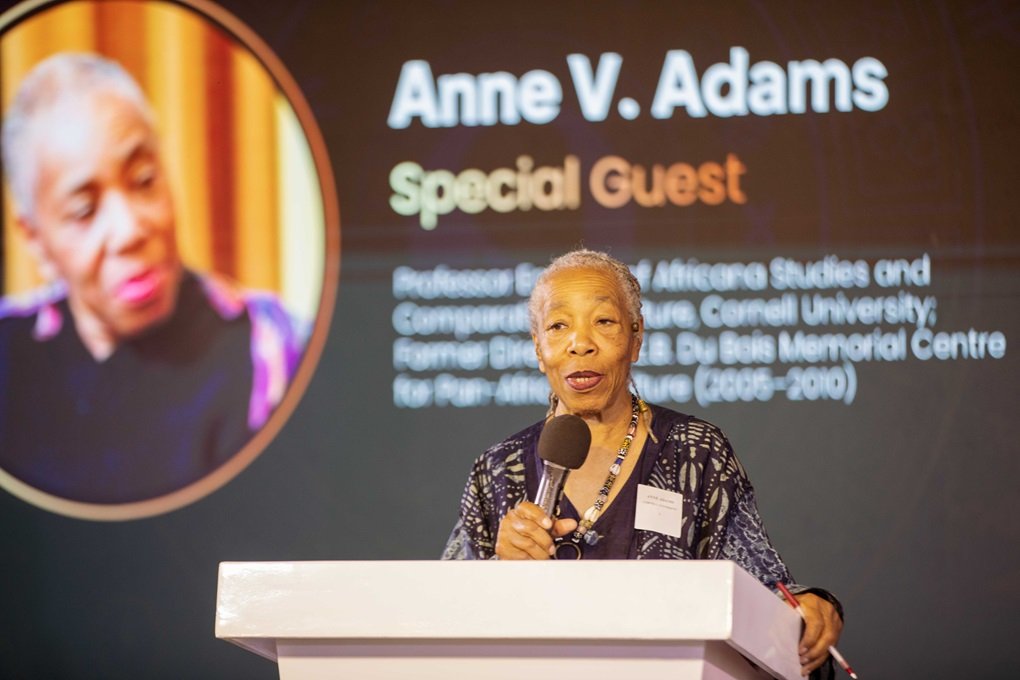The Executive Director of the J.J. Rawlings Foundation, Yaa Asantewaa Agyeman-Rawlings, has described the move by her late father, Flt. Lt. Jerry John Rawlings, to establish the W.E.B. Du Bois Memorial Centre for Pan-African Culture in 1985 as a visionary step aimed at promoting Pan-African ideals, fostering unity, and celebrating African heritage.
She said the decision to intervene in the fate of W.E.B. Du Bois’ home was, as President Rawlings stated, “a duty to history”, viewing it as a responsibility to the memory and stories of the struggles of our heroes.

Ms. Agyeman-Rawlings made the remarks while delivering the keynote address at a ceremony to mark the 40th anniversary of the dedication of the W.E.B. Du Bois Memorial Centre for Pan-African Culture in Accra on Sunday.
She said: “The establishment of the Du Bois Memorial Centre for Pan-African Culture in 1985 was not merely a gesture of political populism; it represented a significant act of historical reclamation, affirming that Du Bois is not a peripheral figure in our collective memory but rather at the heart of Ghana’s identity. Du Bois’ residence was not merely a house; it became a sanctuary where he could rest with dignity—where his memory could live, breathe, and inspire.”

The Executive Director of the J.J. Rawlings Foundation noted that the institution would do its best to ensure that the Centre remains a vital hub for promoting Pan-Africanism, cultural exchange, and education, thereby inspiring individuals from around the world to reflect on the ideals of unity, equality, and freedom that Dr. Du Bois championed.
Personalities such as Dr. Mohammed Ben Abdallah, Esi Sutherland-Addy, Fritz Baffoe, and Valerie Anne Sackey, who were instrumental in the establishment of the Centre, were praised for their varied roles in the process.

Other speakers at the event included Japhet Aryiku, Executive Director of the W.E.B. Du Bois Museum Foundation; Jeffrey Peck, grandson of W.E.B. Du Bois; and the Minister of Tourism, Culture and Creative Arts, who was represented by Maame Efua Houadjeto, Chief Executive Officer of the Ghana Tourism Authority.
Dignitaries at the event included former First Lady Nana Konadu Agyeman-Rawlings, Head of the Agbotui family Colonel Joshua Agbotui, Madam Judy Nkansah (sister of President Rawlings), former CDS General Nunoo Mensah, Dr. Raymond Atuguba, as well as Amina and Kimathi Agyeman-Rawlings.

A ceremonial cake was cut to commemorate the 78th birthday of President Rawlings.
In 1985, aside from leading the re-establishment of the Centre, President Rawlings also ensured that the remains of W.E.B. Du Bois were transferred from Osu Castle to his residence—the current location of the Centre at Cantonments in Accra.

Find below the full text of Ms. Yaa Asantewaa Agyeman-Rawlings address:
40TH ANNIVERSARY OF THE DEDICATION OF THE W.E.B. DU BOIS MEMORIAL CENTRE FOR AFRICAN CULTURE
KEYNOTE ADDRESS BY MS. YAA ASANTEWAA AGYEMAN-RAWLINGS, EXECUTIVE DIRECTOR OF JJ. RAWLINGS FOUNDATION
- SUNDAY, JUNE 22, 2025
The Executive Director of the W.E.B. Du Bois Museum Foundation, Japhet Aryiku,
Her Excellency Nana Konadu Agyeman-Rawlings, former First Lady,
Honourable Minister of Tourism, Dzifa Abla Gomashie,
Honourable Fritz Baffour, Former Minister and Member of Parliament,
Dr. William Evans Anfom
Dr. Mohammed Ben Abdallah,
Senator Conmany Wesseh,
Madam Anne Adams,
Madam Bernice Deh-Kumah,
Mr. Sekou Nkrumah, son of Osagyefo Dr Kwame Nkrumah, Ghana’s First President
Jeffery Alan Peck, grandson of W.E.B Du Bois
Distinguished Guests,
Ladies and Gentlemen
Introduction
We have gathered here today to commemorate a significant milestone – the 40th anniversary of the W.E.B. Du Bois Centre for Pan African Culture, established by the late President Jerry John Rawlings on June 22 1985.
On this day, forty years ago, one of Africa’s youngest and charismatic leaders turned 38 years old, and marked the occasion with the official opening of a Centre named in honour of one of the greatest thinkers and activists of pan-africanism. This Centre is indeed an indelible testament to Ghana’s commitment to Pan-Africanism and its reverence for the legacy of Dr. W.E.B. Du Bois, a towering figure in African American political history and a staunch advocate for human rights and dignity.
W.E.B. Du Bois Centre for Pan African Culture is also living proof of the collective contributions of the many African-Americans who migrated to Ghana soon after her independence to contribute their skills to the efforts to build the country as a beacon of hope and light to Africans in the diaspora and elsewhere in the world. Among them were Robert Freeman who established the State Insurance Corporation, together with Kobina Woode and H. P. Nyemitei; as well as Dr. Robert Lee, the dentist, Maya Angelou and several others like the founder of the All Afra Electrical Company which exists till today.
Due to their efforts, Ghana emerged as the Mecca for all the freedom fighters and progressive figures from the United States, attracting notable figures such as Louis Armstrong, aka Satchmo; Malcom X, and Mohammed Ali and not forgetting Martin Luther King Jnr who was present at Ghana’s Independence in 1957. This day commemorates their significant contributions to the development of Ghana.
Du Bois’ position as a renowned scholar, civil rights activist, and Pan-Africanist who dedicated his life to fighting racial oppression and promoting unity, among African peoples worldwide, cannot be assailed. Born in 1868 in Great Barrington, Massachusetts, he rose to prominence as a leading intellectual and activist, co-founding the National Association for the Advancement of Colored People (NAACP) and editing its influential publication, The Crisis.
In 1961, at the prime age of 93, Dr. Du Bois accepted an invitation from President Kwame Nkrumah to move to Ghana and direct the Encyclopedia Africana project, a monumental endeavour to document African contributions to global civilisation.
He spent his final years in Ghana, working tirelessly on this project. Dr. Du Bois passed away in 1963, tying his legacy to Ghana, having chosen her as his final home. His life’s work and his legacy are irrevocably linked to Ghana.
As a writer, author, Pan-Africanist, and freedom fighter, Du Bois focused his work on the dignity of African people and highlighted the significant contributions that those of African descent can make to global human development—not just in the United States, his home country, but worldwide. His writings remain a source of inspiration for us even today.
Regrettably, following Dr Kwame Nkrumah’s ousting, Ghana’s prominent position in advancing the pan-African vision diminished, and Du Bois’ residence fell into disrepair. The property was vandalised, the structure was disrespected, and a once-proud symbol of African excellence and intellect was allowed to deteriorate. This was the state of Ghana that Flt Lt Jerry John Rawlings encountered—not only in political and economic terms, but also culturally. He assumed power during turbulent times, with the burden of restoring not only governance, but also the soul of a nation that had lost sight of its original Pan-Africanist vision – A vision spear headed by Ghana’s very own Dr Kwame Nkrumah.
A Duty to History
The establishment of the W.E.B. Du Bois Memorial Centre for Pan African Culture by President Rawlings was a visionary move, aimed at promoting Pan-African ideals, fostering unity, and celebrating African heritage. The decision to intervene in the fate of Dr du Bois’ home was – as President Rawlings said – “A duty to history,” viewing it as a responsibility to the memory of the stories and struggles of our heroes.
Jerry Rawlings saw in Du Bois an African-American intellectual; a Pan-African genius committed to African unity, justice, and intellectual emancipation. He was impressed by Du Bois’ life-long quest for African-self-governance and self-determination. He admired Du Bois’ resistance to colonialism and racism, and he was struck by the fact that Du Bois, even in exile, had chosen Ghana – the land of the Black Star – as his final refuge, and his final resting place. My father envisioned the Centre not simply as a museum, but as a living space of scholarship, dialogue, and education. A place where students, thinkers, and activists could walk the same halls, stand under the same trees, and ask the same questions Du Bois once did: What does it mean to be African? What does it mean to be free?
The establishment of the Du Bois Memorial Centre for Pan African Culture in 1985 was not merely a gesture of political populism; it represented a significant act of historical reclamation, affirming that Du Bois is not a peripheral figure in our collective memory but rather at the heart of Ghana’s identity. Du Bois’ residence was not merely a house; it became a sanctuary where he could rest with dignity. Where his memory could live, breathe, and inspire.
Distinguished Ladies and Gentlemen
As we celebrate this anniversary, we honour Dr Kwame Nkrumah’s vision; we honour Dr. Du Bois’ remarkable life and work; and we honour Flt Lt Jerry John Rawlings’ foresight in creating this institution. We in the JJ Rawlings Foundation shall continue to do what we can to ensure that the centre remains a vital hub for promoting Pan-Africanism, cultural exchange, and education, thereby inspiring individuals from around the world to reflect on the ideals of unity, equality, and freedom that Dr. Du Bois championed. This 40th Anniversary of the founding of this Centre provides us with a unique opportunity to look down memory lane and recognise the contributions of those who played various roles in its founding.
Foremost among them is Dr. Mohammed Ben Abdallah, who was then Ghana’s Minister for Culture and Prof. Esi Sutherland Addy from the Institute of African Studies at the University of Ghana who later joined Dr. Ben Abdallah at the Ministry of Education to roll out the most ambitious reforms of our Basic Education System in the late 1980s.
Not to be left out in the roll of honours is the Honourable Fritz Baffoe and the late Valerie Anne Sackey who liaised between President Jerry Rawlings and Dr. Ben Abdallah in the execution of the Project. In addition, may I extend my appreciation to all those unnamed figures who in their diverse ways made it possible for the dedication of this Centre forty years ago.
Distinguished Ladies and Gentlemen,
May I conclude with a quote from President Rawlings, at the inauguration of the Du Bois Memorial Centre 40 years ago today – “No monument will please Du Bois more even in death, than that the house in which he spent his last days will become a rallying point where black people from all over the world, and all those who have truly dedicated themselves to the cause of justice and the triumph of the human spirit will come to seek inspiration and guidance.”
God bless Ghana. God bless Africans and people of African-descent around the world.
Thank you.
Signed:
Kobina Andoh Amoakwa
(Communications Directorate)